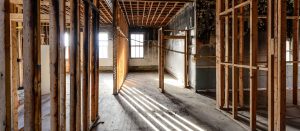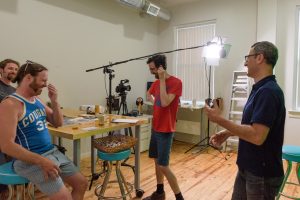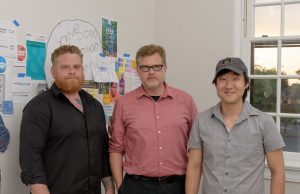Our Story
A Local Exchange: the Michigan Bell Telephone Company
The two-story building that sits at 209 Pearl Street was constructed in the mid-1920s by the Michigan Bell Telephone Company. To our knowledge, the site, while situated on a block with an opera house, a movie theater, and dozens of thriving retail shops, had not been built on prior to the construction of the building that stands on the site today. The vacant property was purchased by the Michigan Bell Telephone Company on September 1, 1925 from Louis M. James and Nancy E. James of Ypsilanti for “the sum of one dollar and other valuable considerations.” Ground was broken on October 22, 1925, and Ypsilanti Mayor Hugh Van der Walker helped place the cornerstone seven months later, on May 20, 1926, officially opening the building.
In the phone company parlance of the day, the building at 209 Pearl was a “local exchange” – the communications node through which all local telephone traffic travelled. The switchboard, operated by a number of young women under the direction of Chief Operator Edna Hutting, was located on the second floor of the building, where Landline Creative Labs currently exists. According to press accounts at the time, the second floor, in addition to housing the switchboards, was also outfitted with a kitchen, a cafeteria, and “parlors” for the staff, while the ground floor contained offices and a retail store, where phones, telephone service and directory ads were sold. [By “parlors,” we’re assuming that the “Daily Ypsilantian,” the paper that wrote about the building’s ground breaking in 1925, meant bathrooms.]
While we’re unsure of all the people and businesses that have called 209 Pearl home since Michigan Bell Telephone sold the building in 1964, we know that, most recently, the second floor was a boarding house, where approximately 12 individual bedroom units shared two bathrooms. The boarding house, which was operated by Ken Hayes, closed in September 2014, when a fire that started in one of the bedrooms spread through the second floor. While, thankfully, no one was injured in the fire, the second floor was gutted, and remained vacant until 2016, when the building changed hands again, and renovations began. [Given the windows that were broken during the fire, the damage to the roof done by both firefighters and the fire itself, and the subsequent deterioration of the structure due to years of water intrusion, the renovation was significant.]
A New Chapter
 Mark Maynard and Jesse Kranyak, having looked for over a year for a downtown Ypsilanti property where they might be able to assemble a creative community of designers, photographers, videographers, podcasters, writers and other creative professionals, purchased the building in March of 2016. The building, they thought, while it needed significant work, was perfect for what they had in mind, as it was conveniently located just across the street from the Ypsilanti transit center, and right around the corner from Michigan Avenue… And it certainly didn’t hurt that the building came with an existing first floor tenant, Frank Dodd, and his iconic Ypsi barber shop, Frank D’s.
Mark Maynard and Jesse Kranyak, having looked for over a year for a downtown Ypsilanti property where they might be able to assemble a creative community of designers, photographers, videographers, podcasters, writers and other creative professionals, purchased the building in March of 2016. The building, they thought, while it needed significant work, was perfect for what they had in mind, as it was conveniently located just across the street from the Ypsilanti transit center, and right around the corner from Michigan Avenue… And it certainly didn’t hurt that the building came with an existing first floor tenant, Frank Dodd, and his iconic Ypsi barber shop, Frank D’s.
Maynard and Kranyak, with the help of the Ypsi branch of the Bank of Ann Arbor, were able to both purchase the building and secure a $200,000 construction loan to build-out the space for Landline Creative Labs. And, after that, the rest of the pieces started falling into place. Jennifer Olmstead and the folks at Ann Arbor SPARK, recognizing the benefit of having creative professionals put down roots in downtown Ypsilanti, encouraged Maynard and Kranyak to apply for an Ypsilanti Incentive Program grant for $56,000, allowing them not only to address the fire damage, but also to put a deposit on a wheelchair lift that would make the entire second floor fully accessible. [It should be noted that the Ypsilanti Incentive Program, while administered by SPARK, was funded by the Washtenaw County Board of Commissioners, who had the foresight to set funds asside for the just such opportunities to seed new industries and create jobs on the eastern side of the County.]
The collaboration didn’t end there, though. The Ypsilanti Downtown Development Authority and the Ypsilanti City Council were both also enthusiastic supporters of Landline from the outset. Before the building was even purchased, City Council voted unanimously to award an Obsolete Property Rehabilitation Act tax incentive, and the DDA came forward with both a $2,000 grant to put toward the historic window renovation, and another $5,000 to put toward the wheelchair lift. And it wasn’t just money that the City came forward with. City employees were also available night and day to assist as issues came up during the redevelopment of 209 Pearl, as was often the case.
Commenting on the various parties that had to come together to make the project a reality, Maynard said at the time, “Not to overstate how significant the development of Landline is, but, in our eyes, it really demonstrates what can happen when motivated people with good ideas, a little working capital, and decent work ethics, collaborate with City and County government to move toward a common goal.”
In total, between bank loans, grants, and further investments on the part of Maynard and Kranyak, approximately $293,000 was invested in the renovation of 209 Pearl’s second floor. And, with the help of Roger Wallace (electrical), Safaa Pauls (plumbing), Adam Lacca (plaster), Dustin Schultz (windows), Mike Reyna (floors), John Taylor (HVAC), Brad “Handy” Hale (handyman), and Steve Hughes, Kevin Lynn, and Blake Woodruffe (carpentry), Maynard and Kranyak were able to build-out Landline’s 10 private offices, and all of the communal spaces and infrastructure elements that connect them.
Also instrumental in the first phase of 209 Pearl’s redevelopment were the following individuals, all of whom gave freely of time and wisdom; Bill Kinley, Paul Saginaw, Dug Song, Richard Murphy, Phil Tepley, Michael Gay, Andre Grewe, Bee Roll, Sean Cool, Tony VanDerworp, Hedger Breed, Jeff Irwin, Paul Schutt, Frank Dodd and Gary Bruder.
Landline Creative Labs
 On June 15, 2017, with all ten offices filled, Landline opened to the public. At the time, Maynard said the following. “Since my friends and I first started the Shadow Art Fair, over a decade ago now, I’ve wanted to do something like this,” he said. “While it was great and exciting to bring the most interesting and creative people that we could find together for one day a year at the Shadow, I’ve always wondered what might happen if we could do something more permanent, something with deeper roots into the community. I was confident that the future of this little town that we love lay in the creativity of its people, and I wanted to see what might be possible with a little support and infrastructure. I wanted to have an actual place in town where people engaged in creative business pursuits could work in proximity to one another, occasionally collaborating, sharing insights, and dreaming up new ventures, all while contributing to the vibrancy of our downtown. And, now, (we) actually have a chance to try it out.”
On June 15, 2017, with all ten offices filled, Landline opened to the public. At the time, Maynard said the following. “Since my friends and I first started the Shadow Art Fair, over a decade ago now, I’ve wanted to do something like this,” he said. “While it was great and exciting to bring the most interesting and creative people that we could find together for one day a year at the Shadow, I’ve always wondered what might happen if we could do something more permanent, something with deeper roots into the community. I was confident that the future of this little town that we love lay in the creativity of its people, and I wanted to see what might be possible with a little support and infrastructure. I wanted to have an actual place in town where people engaged in creative business pursuits could work in proximity to one another, occasionally collaborating, sharing insights, and dreaming up new ventures, all while contributing to the vibrancy of our downtown. And, now, (we) actually have a chance to try it out.”
Moving Ahead
 In early 2018, Maynard and Kranyak brought in a third partner, Dan Klenotic, an accomplished chef. Together, they began laying the groundwork for a sandwich shop on the ground floor of 209 Pearl Street.
In early 2018, Maynard and Kranyak brought in a third partner, Dan Klenotic, an accomplished chef. Together, they began laying the groundwork for a sandwich shop on the ground floor of 209 Pearl Street.
